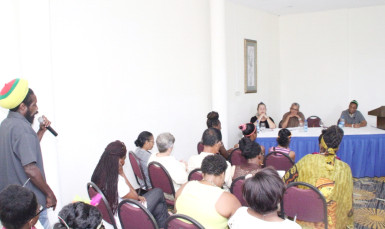The total number of reported cases of domestic violence fell by more than 2,000 between 2013 and 2014.
This is according to statistics provided by lecturer in the Gender Affairs Department of the University of Guyana Audrey Benn at the launching of the 2015 Violence Against Women campaign by The NGO Caribbean Development Foundation (NCDF). The data provided by Benn showed that while a total of 3,247 cases of domestic violence were reported to the police in 2013, only 879 were reported in 2014.
The launch, which was held yesterday at the Pegasus Hotel, saw presentations being made by Benn as well as Danuta Radzik of Help and Shelter and Karen de Souza of Red Thread.

Benn, in her presentation, noted that statistics furnished by the Guyana Police Force provide surprising information about the reporting of domestic violence and rape in Guyana. Her data highlights that while women are twice as likely to report instances of domestic violence, men have accounted for thousands of reported cases of domestic violence.
She said, “In 2010 the number of reported cases were 1,673 males and 2,368 females; 2011 saw 2,887 males and 2,110 females; 2012, 2,761 males and 1,038 females; 2013, 749 males and 2,498 females while 2014 saw 603 males and 276 females reporting instances of domestic violence.”
The data also shows that between 2013 and 2014, there was a more the 70% reduction in the number of reported cases, Benn said.
The number of prosecuted cases also shows a similar decline, with cases prosecuted over the same five-year period being “182 male reports and 1,473 female reports in 2010; 308 male reports and 1,366 female reports in 2011; 523 male reports and 1, 4070 female reports in 2012; 475 male reports and 1,196 female reports in 2013; and 216 male reports and 213 female reports in 2014.”
de Souza, however, believes that these figures need further investigation before any conclusions can be drawn. She charged that several of the male reports may in fact be a case of the abusers getting wiser.
“The man beat you up and you ready to deal with it, you go to the station and make a report but he fly down to the station before you though and make a report that you do something to him and that’s the report that goes into the systems,” she said.
de Souza added that many police officers do not see domestic violence as something that should be investigated.
Instead in cases where there are conflicting reports the first reporter is considered the true victim.
“Instead of them investigating, you get arrested and if you lucky he get arrested too and both of you in front the court wasting the court’s time,” she further said.
Both Benn and de Souza reiterated that one of the main underlying causes of domestic violence lies in how we socialise children. It is through this process that dangerous gender norms are inculcated into our boys and girls.
“Girls are still being told that they must be seen and not heard,” Benn said.
“If your son is brought up to believe that he is the man and his sister has to hear wha he say, then when he grows he will believe that he is a man his wife must hear wha he say; and if you bring up your girl child to believe that she must listen to she brother then what follows is listen to your husband. Abusers are not born, they are made,” de Souza added.
The campaign by NCDF follows a 2010 campaign which lobbied regional governments to strengthen the NGO sector so that it can serve victims of domestic violence, since it believes that the NGO sector has the most experience in the field.
Following consultations with the NGO sector in the Caricom area, petitions, known as the cascadia protocol petitions, were generated as summaries of the main recommendations put forward for coping with the issue of domestic violence in the region.
According to NCDF, the aim of the recommen-dations in the protocol is to provide regional govern-ments with broad-based policy guidelines for the implementation of pro-grammes and procedures that will directly and indirectly provide women experiencing violence in the home with a greater level of support and protection.
The ten recommen-dations generated from the protocol for Guyana include suggestions for domestic violence units to be implemented at every police station in Guyana; the police force to provide security for shelters, ie, camera monitoring and periodic drive-by checks as well as mandatory reporting of suspected cases of domestic violence by medical and health professionals; and the implementation of a data collection system on domestic violence in the health sector, police force and judiciary.
The protocol further recommends mandatory counselling for perpetra-tors of domestic violence; the implementation of age appropriate domestic vio-lence awareness pro-grammes in secondary schools; the establishment of a capital fund by the Government of Guyana for the maintenance of shelters; and the implementation of the 1% transfer of income tax system.
The income tax would be transferred to public benefit organisations working to eradicate violence against women. In addition, the protocol recommends the provision of transitional housing by the Government of Guyana to shelters working with victims of domestic violence and the creation of a Caribbean regional witness protection pro-gramme for victims of domestic violence assessed as being at risk of being murdered by their spouse/partner.










